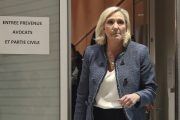
China said on February 4 that mutual political trust with Russia has continued to increase after Vice-Foreign Minister Ma Zhaoxu visited Russia and met with Russian Foreign Minister Sergei Lavrov.
Moreover, China expressed its plans to cooperate with Russia to enforce their strategic partnership and encourage greater progress in their relationship, the Foreign Ministry declared in its statement.
Chinese President Xi Jinping and Russian President Vladimir Putin announced a strategic partnership in Moscow a year ago to fend off the influence of the United States and declared that they would have no “forbidden” areas of cooperation.
Besides, Ma met with Russia’s Deputy Foreign Ministers Andrey Rudenko and Sergey Vershinin during his visit to Moscow on Thursday and Friday last week, the statement said. During his meetings, both parties exchanged perspectives on bilateral and multilateral cooperation as well as international and regional matters of common concern, the statement elaborated.
Such a declaration came amid rising tensions between China and the United States after a Chinese balloon was spotted hovering over U.S. airspace.
Although Washington has portrayed the balloon as a spy balloon, China claimed that it was an airship for civilian meteorological and other scientific purposes. The furor prompted the United States to postpone an expected visit to China by Secretary of State Antony Blinken, which was slated to start on Friday.
The Chinese ministry’s statement about Ma’s visit omitted any mention of Ukraine, where Russia has been conducting a military operation for nearly a year. China has refrained from decrying Russian actions or calling it an “invasion.”
Additionally, Lavrov said on Thursday that Moscow’s relations with China had no limits and, despite not being a formal military alliance, were of a much higher and wide-ranging nature.
Last month, China dismissed a report that the United States has evidence hinting that some of China’s state-owned firms may be helping Russian actions in Ukraine, saying Washington should cease sending weapons if it wants the Ukraine conflict to end. In turn, U.S. officials have noted their concern to the Chinese government, a source familiar with the matter said. The officials contacted Chinese authorities through diplomatic channels, the source disclosed.
“We will continue to communicate to China the implications of providing material support to Russia’s war against Ukraine,” said White House Press Secretary Karine Jean-Pierre.
The Chinese side rejected this accusation. China “would never add fuel to the fire, still less exploit the crisis,” said Foreign Ministry spokesman Mao Ning at a regular press briefing in Beijing. “The US is the one who started the Ukraine crisis and [is] the biggest factor fuelling it.”
“Rather than reflecting on its own acts, the US has been sowing paranoia and pointing fingers at China,” she said. “We reject such groundless blackmail, and would not sit by and watch the US harm the legitimate rights and interests of Chinese companies.”
The support from Chinese companies included non-lethal military and economic assistance that stops short of a wholesale evasion of the sanctions regime that the United States and its allies enforced after the Russia-Ukraine crisis broke out about a year ago, according to a report by Bloomberg News on January 25, citing people familiar with the matter.
The sources said that such a trend was concerning enough that U.S. officials broached the matter with their Chinese counterparts, and cautioned them about the ramifications of supplying material support for the war, although they declined to provide details of those contacts.
Xi has refrained from lambasting Russia over the war and instead has offered to play a role in peace talks. The Chinese leader has also expressed his stance against the use of nuclear weapons in the conflict.
The United States has cautioned the Chinese government of consequences should China provide arms to Russia for use against Ukraine.
U.S. officials view the present activity as worrying and believe it is “a significantly scaled-down version of the PRC’s [People’s Republic of China] initial plan, which was to sell lethal weapons systems for use on the battlefield,” the source revealed. It is unclear if the Chinese government is cognizant of the activity, the source chipped in.
Moreover, U.S. State Department spokesman Ned Price said Washington has been very clear with China about the consequences of supplying material to support Russia’s actions in Ukraine, though he declined to confirm Tuesday’s reports.
“But we would be concerned if we were to see not only the PRC itself engaging in this, but Chinese companies — PRC companies — doing this,” Price told reporters.
Still, it would be highly unlikely that Xi would cut ties with Putin in the face of Western reprisals. After all, in light of Beijing’s foreign policy, close ties with Russia are about pragmatism, self-interest, and a larger concern — the United States. Indeed, both leaders worry about regime survival, oppose U.S. hegemony, and believe in inevitable Western decline. Also, Beijing distrusts the North Atlantic Treaty Organization (NATO).
Admittedly, the Ukraine conflict has unearthed loopholes in the Sino-Russia relationship. For instance, the crisis has revealed the limits of the two sides’ ability to influence each other. Russia has not been able to obtain prominent military support (as far as we know) or even large-scale investment from China, nor has Xi persuaded Putin to withdraw from a conflict that catalyzed an overall global economic slowdown.
Overall, trade has increased between the two countries, hitting a record in 2022, partially due to escalating oil and gas prices. Notably, Russia is increasingly reliant on China as a source of technology and industrial parts, whereas consumers depend on Chinese goods — in 2022, one in seven cars sold in Russia was Chinese, more than twice the share in 2021.
Conversely, Russia requires a market for its own exports, as private companies have not swarmed to Russia, a location that was relatively unattractive even before the war and made even more so with global sanctions.
Although China has procured cheap hydrocarbons from the Russia, the Chinese Communist regime is fixated on energy security and supply diversity, explaining its landmark $60 billion liquefied natural gas deal signed with Qatar, efforts to deepen ties with gas-exporting Turkmenistan, and the seeming dearth of official enthusiasm for the long-contemplated Power of Siberia 2 gas pipeline that Russia has advocated. Observers contend that while the gas pipeline project with Russia may well materialize, it would do so on China’s timeline. In 2022, China accounted for about a fifth of Russia’s exports, but Russia’s imports and exports comprised three percent of China’s total trade.
Undoubtedly, Russia has few choices for diplomatic allies. Hence, Russia’s decreased influence would facilitate the Sino-Russia relationship to run more smoothly, again on China’s terms, as Moscow will have to concede in any disagreements, argues Alexander Korolev of the University of New South Wales, who studies Russian and Chinese foreign policy and has published a book on the strategic alignment.




